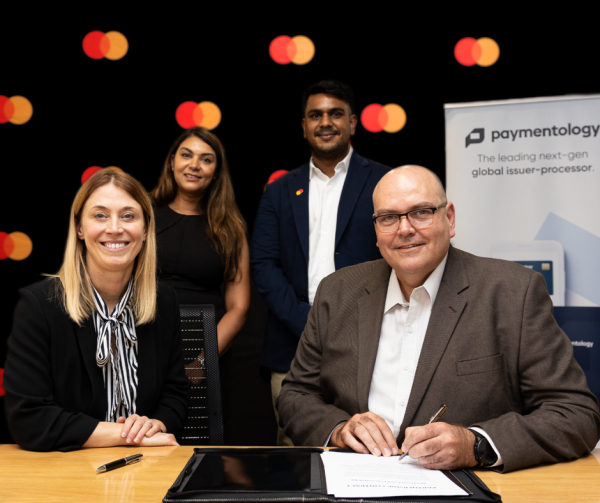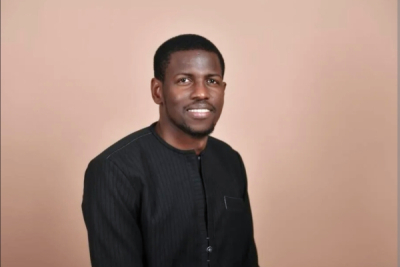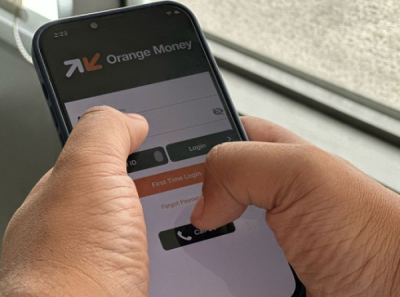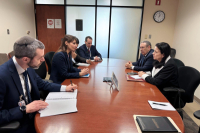Mastercard announced on March 17 that it is strengthening its partnership with Paymentology, a company that helps banks and fintechs create, manage, and process card payments, to simplify card issuance for South African fintechs.
This collaboration provides the expertise, infrastructure, and speed needed to scale payment solutions, driving financial inclusion and digital growth.
Mastercard offers global payments infrastructure and security, while Paymentology provides cloud-based processing and program management. Their combined expertise ensures faster, more efficient card issuance.
The Malian government is prioritizing digital technology to boost national economic growth. A core component of this strategy is the digitization of public services.
Malian Prime Minister Abdoulaye Maïga launched two digital platforms designed to enhance public service delivery to citizens on Tuesday, March 18. The platforms, "Trésor Pay" and the Land Information System/One-Stop Land Office (SIF/GUF), mark a step in Mali's digitalization efforts.
"Trésor Pay," a collaboration with all Malian mobile money operators, streamlines and secures payments for services including national identity card and passport fees, traffic violations, and fixed fines. Developed by the Support Unit for the Computerization of Tax and Financial Services (CAISFF) with the National Directorate of Treasury and Public Accounting, the platform is already operational at the Directorate General of Transport and the City Hall of Commune IV.
The SIF/GUF platform modernizes land and property procedures, enabling users to complete all land management operations in a single location. The system is slated for implementation across Bamako's seven districts within the year, aligning with the Government Action Program (PAG) objectives.
These platform launches reflect the Malian government's dedication to digitizing administrative services and improving citizen access to public procedures. This initiative follows the recent launch of a digital platform simplifying access to administrative, identity, and travel documents for the Malian diaspora.
Mali has risen 13 places to 141st out of 193 countries in the 2024 United Nations e-Government Development Index (EGDI). However, challenges persist in enhancing the accessibility and efficiency of digital services. The government’s recent initiatives are expected to further improve Mali's EGDI ranking, optimize public revenue collection, and strengthen governance in the coming years.
Samira Njoya
As digital technology rapidly expands in Africa, data sovereignty is increasingly becoming a business imperative. Across the continent, innovative initiatives are emerging, offering localized solutions to ensure regulatory compliance and safeguard sensitive data.
A new cloud platform, 'Door,' developed by Cloudoor in collaboration with Groupement Orange Services (GOS), is set to launch in West Africa, offering a locally developed alternative to existing foreign cloud infrastructure. The platform aims to address data security and regulatory compliance concerns within the region.
"This initiative marks a decisive step toward strengthened digital sovereignty for African businesses. With this sovereign cloud offering, we are providing local economic players with the necessary tools to innovate, grow, and compete globally while maintaining full control over their data," said Aliou Ba, CEO of Cloudoor.
The innovation arrives as data protection becomes a strategic priority for African businesses and governments. PricewaterhouseCoopers' (PwC) "Africa Cloud Business Survey 2023 – Unlocking the Transformational Power of Cloud in Africa" identifies obstacles to cloud adoption, including budget constraints and a lack of high-quality local providers. Despite these challenges, over 50% of African businesses have adopted cloud computing, according to the study.
Cloudoor and GOS designed Door to address these challenges by making data storage more affordable and accessible. The platform utilizes the Tiers III data center infrastructure of GOS, a key component of Orange's African data center network. This data center, built in Grand-Bassam, Côte d'Ivoire, in 2016, spans 16,600 square meters. Door will officially launch in Abidjan on April 24 and in Dakar on April 29, marking a milestone in strengthening digital sovereignty in Africa.
In addition to secure data hosting, Door offers services aimed at accelerating innovation and modernizing African businesses' information systems. The platform includes a managed DevOps offering to optimize development processes and reduce time-to-market, enabling companies to address technological challenges. Door Deploy, a complementary solution, simplifies the deployment of applications, databases, and artificial intelligence (AI) models on GPU servers.
By Samira Njoya,
Editing by Sèna D. B. de Sodji
Digital transformation is one of the priorities of the Ghanaian authorities, who are relying on international cooperation to achieve their goals.
Ghana and Germany discussed strengthening their collaboration in the digital sector during a meeting between Minister of Communication, Digital Technologies, and Innovation, Samuel Nartey George, and a German delegation on March 17.
The talks centered on promoting research and development in digital technologies, supporting information and communication technology (ICT) startups and entrepreneurs in Ghana, and accelerating the adoption of digital solutions.
This collaboration aligns with Ghana's ongoing digital transformation efforts. In late November 2024, the government launched a digital economy policy to leverage technology for growth, improve public services, and ensure equitable access. In October, a $5 million fund was announced to support technological innovation.
Ghana scored 0.6316 on the 2024 E-Government Development Index, ranking 108th out of 193 countries. The country surpasses West African and African averages but remains below the global average. Further efforts are needed in human capital development and online services, where Ghana scored 0.5586 and 0.6084, respectively.
In cybersecurity, Ghana is considered a global model by the International Telecommunication Union (ITU) in its "Global Cybersecurity Index 2024," though further capacity building is needed.
Germany, a global leader in digital transformation, ranked 12th, scored 0.9382 on the E-Government Development Index, well above the global average of 0.6382. On the ICT Development Index, Germany scored 87.8 out of 100.
A joint study by the International Finance Corporation (IFC) and Google predicts Africa's digital economy will be worth $712 billion by 2050, accounting for 8.5% of the continent's GDP. In 2022, Ghana's ICT sector contributed 21 billion cedis ($1.36 billion) to GDP, representing approximately 4% of the economy, up from 4.4 billion cedis in 2016.
By Isaac K. Kassouwi,
Editing by Sèna D. B. de Sodji
Orange, a leading telecommunications provider in Madagascar, is expanding its efforts to enhance user experience. The company is launching a new strategic application within the mobile money sector.
Orange Madagascar introduced Orange Money Pro, a mobile application for merchants and distributors, on Tuesday, March 18, aiming to streamline financial transaction management and enhance the mobile money experience for professionals.
The new application offers faster transaction processing and features tailored to merchants' needs, including real-time transaction tracking, payment management, and improved financial flow visibility.
For distributors, Orange Money Pro simplifies point-of-sale management, banking connections, and access to customer support. Merchants can utilize QR code payments and generate remote payment links. The application, currently available exclusively on Android, has been downloaded more than 10,000 times, according to Google Play Store statistics.
Amidst the growing digitization of payments in Africa and the rise of mobile money, Orange seeks to bolster financial inclusion and simplify business operations. With Orange Money Pro, the French operator is strengthening its position in Madagascar's mobile money sector and may eventually offer advanced financial services to businesses, such as credit solutions or integrated accounting management. Depending on the app's success in Madagascar, expansion to other markets could follow.
However, adoption may be hindered by factors such as internet access rates, which stood at 32.57% in 2023 according to the regulator, merchants' digital literacy, and compatibility with other financial services. These are challenges that Malagasy authorities are working to address.
By Adoni Conrad Quenum,
Editing by Feriol Bewa
Over the past four years, Cameroon, Gabon, Chad, the Central African Republic, Congo, and Equatorial Guinea have collaborated on a project designed to enable seamless communication for their citizens traveling within the region, eliminating the need to change SIM cards. This initiative seeks to foster greater sub-regional integration.
Central African citizens could soon communicate freely across borders without incurring extra charges, as regional telecommunications ministers have issued a three-month deadline to finalize a free roaming project.
The decision followed a meeting of Telecommunications Ministers of the Central African Economic and Monetary Community (CEMAC) held last week in Bangui, Central African Republic. During the meeting, participants discussed obstacles hindering the initiative, which seeks to eliminate disparities in roaming costs that lead to expensive communications and impede the telecommunications sector's development.
In November 2021, CEMAC countries signed bilateral agreements to implement free roaming. However, the project has faced substantial delays. In April 2024, the Assembly of Telecommunications Regulators of Central Africa (ARTAC) reported that only two of the 213 planned interconnections had been established. These connections involved MTN Cameroon and MTN Congo, and Airtel Gabon and Orange Cameroon.
While the specific obstacles to free roaming were not disclosed, ARTAC's objectives for a 2024 seminar aimed at accelerating the process shed light on potential issues. These include delays in finalizing minutes, including tariff agreements between regulators, late signing of interconnection and roaming contracts, potential technical and legal difficulties for the involved parties, issues related to the separation of roaming and traditional international traffic on direct interconnection links, and the selection of technology for those links.
By Isaac K. Kassouwi,
Editing by Sèna D. B. de Sodji
Africa's digital sector faces a critical labor shortage, threatening the continent's development. Addressing this gap within the next five years is crucial for reducing youth unemployment and boosting economic growth.
Africa's rapid digital transformation, fueled by its tech-savvy youth and innovative local solutions, is creating a surge in demand for specific tech skills. While projections indicate Africa's internet economy could reach $712 billion by 2050, as Google and the IFC highlight, realizing this potential requires a highly skilled local workforce. However, a significant skills gap persists, posing a challenge as digital expertise becomes increasingly crucial across all sectors by 2030.
Software and Application Development
The rise of startups and digital platforms, coupled with businesses embracing digital technologies, is driving demand for developers in Africa. They are essential for building mobile applications, management software, and tailored solutions for industries like healthcare and finance. Google's 2022 "Africa Developer Ecosystem" report showed a 3.8% increase in professional developers, and the COVID-19 pandemic amplified this trend, creating significant opportunities.
Cybersecurity
Trust is fundamental to a digital economy, and that trust hinges on secure electronic systems for communication, payments, and work. Interpol's "African Cyberthreat Assessment Report 2024 Outlook" reveals a continuing rise in cybercrime across Africa. In 2023, organizations in Africa experienced a 23% year-over-year increase in weekly cyberattacks, the highest rate worldwide. Cybersecurity firm Kaspersky points out that this expanding threat landscape, further complicated by artificial intelligence, is creating growing job opportunities for young Africans in diverse cybersecurity specializations.
Artificial Intelligence
The increasing adoption of AI is transforming key sectors in Africa, including agriculture, healthcare, and finance, generating a growing demand for experts in algorithm and intelligent system design. Numerous African countries have launched AI strategies since 2023, with Rwanda and Kenya leading the way in integrating AI into public services. The rise in training programs across the continent reflects the anticipated socio-economic benefits of AI, a view supported by the African Development Bank (AfDB). Importantly, AI's impact will extend beyond engineering, creating new opportunities in creative fields such as graphic design.
Data Science
Data is the new currency of the digital age. As more young Africans engage with the internet, networks, and digital services, vast amounts of data are generated daily, attracting the attention of businesses and governments. BearingPoint forecasts Africa's big data sector to generate $10 billion in direct revenue by 2030, a significant leap from 2019. To achieve this growth, specialists are needed to analyze and interpret data, providing actionable insights for various sectors, including marketing, commerce, and national security. This demand will also create new professional avenues, notably data protection lawyers.
User experience and user interface (UX/UI)
Digital applications and platforms thrive on positive user experience. UX/UI designers, who develop intuitive and engaging interfaces, are essential for ensuring user satisfaction. Market intelligence firm Mordor Intelligence forecasts the global UX/UI market to grow significantly, from $2.2 billion in 2025 to $9.28 billion by 2030. Although Africa's demand may be less pronounced than in other regions due to its evolving digital landscape, it remains a promising market for UX/UI designers.
E-commerce
Africa's e-commerce sector is experiencing rapid growth, with competition increasing annually. Both local businesses and international giants such as Jumia, Takealot, Temu, and Alibaba are investing heavily to expand their reach. Beyond online retail, related professions in platform management, logistics, and digital marketing are also developing. Organizations like MasterCard, the WTO, and UNCTAD are actively working to build and strengthen this ecosystem. TechCabal Insights predicts Africa's e-commerce market will surge from $55 billion in 2024 to $112.73 billion by 2029, representing a 105% increase over five years.
Blockchain and fintech
Blockchain and financial technologies are revolutionizing banking services and transaction security. Since the COVID-19 pandemic, major African banks have accelerated the digitization of their financial services to improve security, convenience, and competitiveness against the growing number of fintech startups. Over the past decade, fintech has been a leading driver of startup creation and investment in Africa. In 2024 alone, fintech startups secured $1.034 billion, representing 47% of the continent's total tech investment, up from 42% in 2023. As financial inclusion initiatives expand, the demand for skilled professionals in this sector is expected to increase significantly.
Cloud computing
Cloud computing adoption is rapidly accelerating across Africa, according to McKinsey. Companies in banking, telecommunications, and oil are increasingly leveraging the cloud to optimize IT costs and reduce operational expenses. This trend has fueled substantial investments in cloud infrastructure, with global players like Amazon, Google, and Oracle expanding alongside local firms such as Africa Data Centres. PwC reports that 12% of African businesses have fully migrated to the cloud, while 38% have integrated it into most operations. An additional 32% have begun migrating select processes, and 19% are exploring cloud solutions. However, PwC cautions that skills shortages are hindering faster adoption. The cloud computing sector requires a diverse workforce to realize its projected growth, with 6W Research forecasting revenues to rise from $20 billion in 2025 to nearly $45 billion by 2031.
Digital Marketing
With Africa boasting over 400 million active social media users, as reported in the Digital Report 2025, the demand for digital marketing professionals is set to rise significantly. These specialists are crucial for effective online campaigns, making social media a vital commercial space for brands and advertising agencies. Recognizing the sector's growth in employment and revenue, some governments are exploring taxation measures. For instance, in late 2023, Kenyan authorities announced a 15% tax on content creators and influencers.
Digital Energy and Green Solutions
The shift towards renewable energy and digital energy management solutions is a key priority for many development organizations, including the French Development Agency (AFD). The increasing frequency of hackathons focused on these topics underscores the growing need for specialized talent in this area. The International Energy Agency (IEA) also emphasizes the critical role of these technologies in modernizing energy infrastructure worldwide, particularly in Africa.
These emerging digital fields represent significant opportunities for Africa's youth, who constitute 60% of the population. The World Economic Forum's "Future of Jobs 2025" report underscores the growing importance of tech skills, particularly in AI and big data, alongside creative thinking and socio-emotional skills.
To capitalize on these opportunities, investment in education and training is essential. Collaboration between governments, businesses, and educational institutions is crucial to prepare Africa's future workforce.
Muriel EDJO
The startup aims to drive financial inclusion in Egypt by offering user-friendly and secure digital payment solutions. Their platform streamlines transactions for millions, accelerating the country's shift towards a digital economy.
Basata Pay is an Egyptian e-payment gateway that links service providers, merchants, and consumers across the country.
Founded in 2009 through the merger of Bee and Masary, the Cairo-based company is now led by Chief Executive Officer Karim Shehata, who took the helm in 2022.
"Basata offers a secure and user-friendly financial payment system, integrating fintech solutions to connect service providers, merchants, and consumers. This innovative platform serves over 40 million users in Egypt, leveraging a network of 150,000 points of sale nationwide," the platform indicates on its website.
Through Basata Pay, users can conveniently pay phone bills, renew internet subscriptions, and settle payments for a range of public and private services, including electricity, water, school fees, transportation, and online gaming.
Spanning all 27 of Egypt's governorates, the service's extensive network of over 150,000 points of sale enables users to easily top up their e-wallets and make payments. Recharge options include Mastercard, Visa, and Meeza.
The company also offers a mobile application, available on iOS, AppGallery (Huawei), and Android, which has been downloaded more than 10,000 times on the Google Play Store, according to the platform. Users can access Basata Pay's services by creating a simple account.
By Adoni Conrad Quenum,
Editing by Feriol Bewa
Artificial intelligence (AI) is reshaping economies and societies, transforming public services, industry, and innovation, among other sectors. By investing in this technology, Morocco aims to strengthen its competitiveness and digital sovereignty.
Moroccan and U.S. officials discussed deepening collaboration in digital technology and artificial intelligence (AI) during meetings in Washington on Monday, March 17, as part of efforts to accelerate Morocco's tech ambitions.
Amal El Fallah Seghrouchni, Morocco's Minister Delegate for Digital Transition and Administrative Reform, met with Steve Lang, the U.S. Ambassador-at-Large for Cyberspace and Digital Policy, and Leila Elmergawi, Director of Global AI Strategy and Policy at the U.S. State Department. The discussions focused on Morocco’s AI roadmap and the Morocco Digital Plan 2030, reinforcing a shared commitment to digital innovation.
"We reaffirmed the strong Morocco-US partnership, advancing cooperation in digital transformation and artificial intelligence to foster innovation and shared prosperity for both our nations," said Youssef Amrani, Morocco’s Ambassador to the United States.
This strategic alliance supports Morocco's "Digital Morocco 2030" initiative, designed to establish the nation as a premier African technology hub. AI is pivotal in this vision, particularly for modernizing public services. Morocco intends to deploy AI-driven solutions to automate administrative processes, analyze data, and enhance service delivery, aiming to leap from 90th to 50th place in the United Nations Online Services Index by 2030.
The United States, according to the Stanford Institute for Human-Centered AI (HAI) AI Index, stands as the global leader in AI, excelling in research, development, and economic impact. Notably, U.S. private sector AI investment ($67.2 billion) dwarfs China's ($7.8 billion), and the U.S. produces significantly more machine learning models (61 vs. 15).
Morocco's strategy leverages this U.S. expertise to expedite its digital transformation and boost its international competitiveness. Enhanced cooperation could unlock access to cutting-edge technologies, bolster digital infrastructure, and attract crucial AI-sector investments. Through strategic knowledge transfer, Morocco also seeks to cultivate its research and innovation capabilities, nurturing a dynamic and competitive domestic AI ecosystem.
By Samira Njoya,
Editing by Sèna D. B. de Sodji
To bridge Africa's digital divide, investment in infrastructure and connectivity is crucial, offering an opportunity to enhance economic inclusion in remote regions.
The Democratic Republic of Congo (DRC) secured $500 million to improve internet access for 30 million citizens, addressing structural challenges in its digital sector.
The project, co-financed by the French Development Agency (AFD) and the World Bank, aims to expand connectivity nationwide and make internet access more affordable by reducing costs and improving network coverage, particularly in underserved areas.
The agreement was signed on Friday, March 14, by DRC Finance Minister Doudou Fwamba Likunde Li-Botayi and French Ambassador to the DRC Rémi Maréchaux.
The DRC's digital sector faces challenges including uneven network coverage, limited internet access, and inadequate infrastructure, hindering economic development and digital inclusion. As of June 30, 2024, the DRC had 59.7 million mobile phone subscribers and 30.7 million mobile internet subscribers out of an estimated population of 95.2 million, according to official figures.
According to the GSM Association (GSMA), 40 million Congolese lack mobile internet access. Meanwhile, the International Telecommunication Union (ITU) reports 3G coverage reaches 55% of the population, while 2G coverage stands at 45%.
Part of the $500 million funding will be allocated to modernize Boma, a city heavily impacted by an economic crisis due to a slowdown in port activities.
The agreement is part of broader efforts to modernize the digital sector and democratize technology access. By strengthening digital infrastructure, the initiative aims to address accessibility and connectivity challenges, paving the way for new economic and social opportunities.
By Samira Njoya,
Editing by Sèna D. B. de Sodji
More...
Madagascar aims to accelerate its digital transformation, making it a key economic driver across all sectors, including healthcare.
The Malagasy government launched a hospital digitalization project, with the Ministry of Public Health and the Ministry of Digital Development, Posts, and Telecommunications (MDNPT) signing a partnership agreement on Friday, March 14.
The project aims to improve governance and transparency in public hospitals and increase access to healthcare.
"Several stages are planned in this project, but optimizing the patient journey and improving patient care have been identified as priorities, as they have a direct impact on the daily lives of the Malagasy population," the MDNPT said in a Facebook statement. Minister of Public Health Zely Arivelony Randriamanantany said digital tools and systems would improve patient management and financial transaction monitoring.
The initiative aligns with Madagascar's 2023-2028 Five-Year Strategic Digital Plan, which seeks to position the country as a key player in Africa's digital economy. In the healthcare sector, the government aims to invest in human capital, improve governance, increase access to care, and strengthen public confidence in the national health system.
The World Health Organization (WHO) said the program could enhance healthcare services and optimize decision-making through real-time data collection, storage, and analysis. In its 2024 report, "Health Data Digitalization in Africa: Unlocking the Potential," the WHO stated, "This data-driven approach helps healthcare professionals choose appropriate treatments and supports policymakers in developing impactful health policies."
By Isaac K. Kassouwi,
Editing by Sèna D. B. de Sodji
In Africa, digital transformation is accelerating the rise of innovative startups that leverage technology to meet the needs of local populations. However, these young companies face several challenges.
Angola's National Institute for the Support of Small and Medium-Sized Enterprises (INAPEM) and the National Institute for the Promotion of the Information Society (INFOSI) signed a memorandum of understanding on Friday, March 14, to support startup development.
The agreement aims to establish a collaborative framework to bolster INFOSI's DIGITAL.AO incubation program, with both agencies committing to joint actions to assist Angolan startups and digital entrepreneurs, fostering innovation. INAPEM will provide institutional and technical support to DIGITAL.AO.
"The objectives of the partnership include identifying and selecting startups and entrepreneurs participating in the program, providing physical incubation spaces, organizing training sessions and capacity-building workshops, offering mentorship and specialized consulting services, and facilitating access to investor networks and potential partners," INAPEM said in a statement.
An International Finance Corporation (IFC) "Assessment of the Angolan Startup Ecosystem," published in November 2023, found the ecosystem is in its nascent stage, characterized by a low number of startups, approximately 125, and resource limitations. The IFC noted no Angolan startup has yet achieved an exit event.
The IFC believes supporting startups, innovation, and entrepreneurship can diversify Angola's oil-dependent economy and create jobs, particularly for youth and women.
However, the IFC recommends Angolan authorities prioritize a startup law to improve the policy environment for young enterprises across multiple areas. This includes strengthening early-stage financing by direct government involvement in creating, investing in, and maintaining startup funding mechanisms. The financial institution also emphasizes integrating entrepreneurship, digital skills, and coding into the national education system, and establishing more vocational training schools to enhance the talent pool.
By Isaac K. Kassouwi,
Editing by Sèna D. B. de Sodji
As digital innovation gradually transforms Africa’s agricultural sector, Kilimo Bando is emerging as an appealing option for Tanzanian farmers.
Bizy Tech, a Tanzanian startup founded in 2015 by Mahmoud Shoo, has developed Kilimo Bando, an agritech solution aimed at improving resource and market access for local farms, thereby boosting productivity and profitability.
The Dar es Salaam-based company designed the service to address key challenges faced by Tanzanian farmers, including limited access to quality inputs, financing, and market opportunities. Its mobile application, currently available only on Android, has been downloaded over a hundred times, according to Play Store data. An intuitive interface allows users to connect directly with certified seed and fertilizer suppliers.
"We identified inefficiencies in access to quality inputs, timely financing, and reliable market linkages for over nine million smallholder farmers in Tanzania. Current solutions lack integration and scalability, making our platform uniquely positioned to fill this gap," said Rahim Shoo, head of product development and business operations at the startup.
Kilimo Bando integrates secure digital payment solutions, facilitating transactions and strengthening financial inclusion for farmers. It also offers several additional features, including Kilimo Akiba, which helps users save within the formal banking system to finance essential services during planting seasons.
Kilimo Bima is an insurance service covering crops, health, life, and equipment, with a particular focus on protecting harvests from disasters or other production disruptions. Kilimo Mkopo provides farmers with loans to invest in and enhance their productivity. Meanwhile, Kilimo Bora trains small-scale farmers in agronomy and soil management to improve crop quality. Kilimo Bando also offers real-time information on weather conditions and best agricultural practices.
The startup claims more than four million registered farmers and over 5,600 merchants. By integrating digital tools into the agricultural value chain, it is helping to modernize Tanzanian agriculture, promote the adoption of sustainable practices, and improve farmers’ resilience to climate and economic challenges.
By Adoni Conrad Quenum,
Editing by Feriol Bewa
Algeria plans for artificial intelligence to contribute 7% to its GDP by 2027, with investments in advanced infrastructure driving this goal.
Minister of Post and Telecommunications Sid Ali Zerrouki laid the foundation stone Sunday, March 16, for Algeria’s inaugural high-performance computing center dedicated to artificial intelligence in Oran. This infrastructure, deemed a strategic move toward digital sovereignty, aims to provide the country with the intensive computing capacity essential for AI technology development.
During his address, the minister said the center aligns with President Abdelmadjid Tebboune’s vision to position Algeria as a leading player in innovation and digital technology across Africa. He highlighted the opportunities this infrastructure will offer researchers, startups, and academic institutions by granting access to advanced technological resources. Equipped with latest-generation graphics processing units (GPUs), the center will provide the necessary power for developing strategic applications in fields such as healthcare, industry, cybersecurity, and smart cities.
This project is part of the recently unveiled national AI strategy, which focuses on several key areas, including strengthening computing infrastructure with data centers and optimized cloud solutions, developing education and research in collaboration with universities and specialized centers, and promoting industrial applications to support startups and businesses in designing AI-based solutions.
With this center, Algeria takes a significant step toward technological autonomy. High-performance computing plays a vital role in optimizing AI models and simulating complex systems in critical sectors such as precision agriculture, energy resource management, and climate modeling. By providing direct access to these advanced computing capabilities, the country reduces its reliance on foreign infrastructure and lowers outsourcing costs. This project contributes to strengthening Algeria’s technological independence while fostering innovation in strategic sectors.
Upon completion, this center is expected to enhance Algeria’s high-performance computing capabilities and accelerate the development of AI applications in key sectors such as precision agriculture, energy resource management, and climate modeling. It will offer local researchers and businesses the opportunity to access advanced technological resources, thereby reducing dependence on foreign infrastructure. This initiative could play a key role in the emergence of a dynamic and competitive AI ecosystem in North Africa.
By Samira Njoya,
Editing by Sèna D. B. de Sodji















